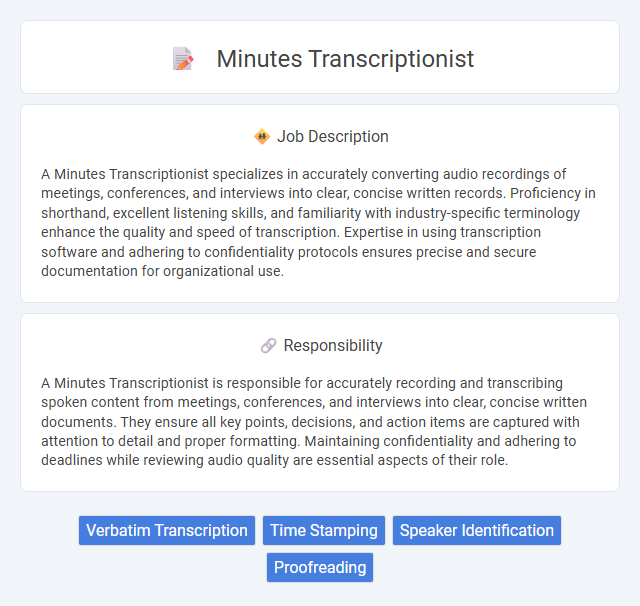
A Minutes Transcriptionist specializes in accurately converting audio recordings of meetings, conferences, and interviews into clear, concise written records. Proficiency in shorthand, excellent listening skills, and familiarity with industry-specific terminology enhance the quality and speed of transcription. Expertise in using transcription software and adhering to confidentiality protocols ensures precise and secure documentation for organizational use.
Minutes transcriptionist roles probably suit individuals with strong attention to detail and excellent listening skills, as accuracy in capturing spoken content is essential. People who prefer quiet, focused work environments are likely to thrive, while those easily distracted or uncomfortable with long periods of typing may find the job challenging. Patience and a good command of language tend to be beneficial for successfully transcribing meetings or interviews.
Qualification
Minutes transcriptionist roles require strong typing speed, exceptional listening abilities, and a high level of accuracy to capture detailed meeting content. Candidates must be proficient in transcription software and possess a solid understanding of industry-specific terminology to ensure precise documentation. Attention to detail and excellent grammar skills are essential for producing clear, professional minutes that support effective communication within organizations.
Responsibility
A Minutes Transcriptionist is responsible for accurately recording and transcribing spoken content from meetings, conferences, and interviews into clear, concise written documents. They ensure all key points, decisions, and action items are captured with attention to detail and proper formatting. Maintaining confidentiality and adhering to deadlines while reviewing audio quality are essential aspects of their role.
Benefit
Minutes transcriptionists likely benefit from flexible work hours that accommodate various schedules, enhancing work-life balance. They probably gain valuable skills in active listening and attention to detail, which may improve overall professional competence. Opportunities for remote work could increase job accessibility and reduce commuting stress, potentially leading to higher job satisfaction.
Challenge
The role of a Minutes Transcriptionist likely presents challenges in accurately capturing spoken words in real-time, requiring exceptional listening skills and quick typing speed. Maintaining focus throughout lengthy meetings might pose difficulties due to the need for consistent attention to detail. The chance of encountering diverse accents or rapid speech patterns could increase the complexity of producing precise and clear minutes.
Career Advancement
Minutes transcriptionists develop expertise in accurate and efficient documentation of meetings, which opens pathways to specialist roles such as legal transcription or corporate communication. Mastery of industry-specific terminology and advanced transcription software enhances potential for promotion to senior transcriptionist or documentation coordinator positions. Ongoing skill upgrades and certifications contribute significantly to career growth and higher earning potential.
Key Terms
Verbatim Transcription
Minutes transcriptionists specializing in verbatim transcription capture every spoken word, including filler sounds and pauses, ensuring complete accuracy of meeting records. This role demands exceptional listening skills, keen attention to detail, and proficiency in specialized transcription software to deliver precise text representations. Delivering verbatim transcripts is crucial for legal, medical, and corporate settings where documented conversations must be exact and legally compliant.
Time Stamping
Minutes transcriptionists specialize in converting audio recordings of meetings into accurate, written records by incorporating precise time stamping throughout the document. Time stamping allows quick navigation to specific moments in the audio, enhancing the usability and relevance of the transcript for users seeking critical information. Mastery of time stamping software and attention to detail are essential skills for producing time-coded transcripts that improve overall meeting documentation and accessibility.
Speaker Identification
Minutes transcriptionists specializing in speaker identification accurately distinguish and label each participant's dialogue in meeting recordings, ensuring clear and organized documentation. This skill enhances the clarity of minutes, making it easier to attribute statements and decisions to specific individuals. Mastery of voice recognition technologies and keen auditory attention are essential for maintaining precision in multi-speaker environments.
Proofreading
A Minutes Transcriptionist specializing in proofreading ensures the accuracy and clarity of meeting records by meticulously reviewing transcribed content for grammar, punctuation, and factual consistency. This role demands exceptional attention to detail and a strong command of language to maintain the integrity of official documents. Precision in proofreading enhances the reliability of minutes used for legal, corporate, and organizational reference.
 kuljobs.com
kuljobs.com